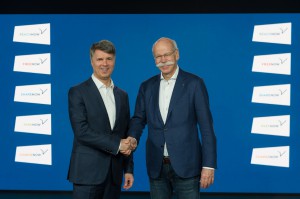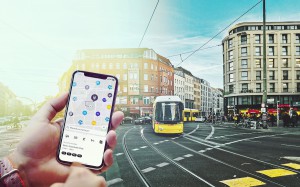
BMW Chief Harald Krueger, left, and Daimler AG Chairman Dieter Zetsche are all smiles after announcing plans to merge mobility operations.
Nearly a year after announcing plans to combine their ambitious mobility services operations, Mercedes’ parent Daimler and erstwhile rival BMW have announced an array of new joint venture projects that will include car and ride-sharing operations that could challenge upstarts like Uber, Lyft and China’s Didi Chuxing.
The two luxury automakers plan to invest a combined 1 billion euros, or about $1.1 billion, to expand the five projects BMW CEO Harald Krueger and Daimler CEO Dieter Zetsche outlined at a news conference Friday, which also include parking and electric vehicle charging. The two newly minted partners also opened the door to cooperation with other automotive manufacturers.
“These five services will merge ever more closely to form a single mobility service portfolio with an all-electric, self-driving fleet of vehicles that charge and park autonomously,” said BMW Chief Executive Harald Krueger.
There’s a broad consensus that the auto industry will undergo massive change over the next decade that goes well beyond the shift from passenger cars to light trucks. The Boston Consulting Group, for example, has estimated that nearly a third of the miles that Americans will clock on the road by 2030 will be in electrified, autonomous vehicles operated by ride-sharing services.
(Daimler, BMW get U.S. approval for mobility company. Click Here for the story.)
One of the big concerns for traditional manufacturers is that they could see sales drop significantly in the years to come. The BMW/Daimler partnership is aimed at establishing a firm stake in the industry’s transformation and ensuring that their vehicles will continue to have a market, whether with consumers, traditional fleet customers, or new mobility service operations.
The two companies are by no means alone. A number of carmakers are exploring services such as ride-sharing, Ford Motor Co. going so far as to redefine itself as a “mobility services company,” rather than an automotive manufacturer. General Motors has already launched a car-sharing service, Maven, and plans to challenge Google spin-off Waymo’s new Waymo One ride-sharing service this year with an autonomous ride-sharing operation.
Other alliances also are being formed, Honda last October agreeing to invested more than $2 billion in GM’s Cruise Automation subsidiary. It is expected to participate in the GM ride-sharing service. Fiat Chrysler Automobiles, Jaguar Land Rover and Nissan are also planning to provide vehicles for use by Waymo One.
For their part, BMW and Daimler left the door open for other possible partners to join their new joint venture.
“Further cooperation with other providers, including stakes in startups and established players, are also a possible option,” Daimler CEO Zetsche said during the Friday news conference.

The combined mobility services of Mercedes and BMW will be available at the touch of a smart-phone button.
(Click Here for details about Daimler investing millions in financing app.)
Under their agreement, the parent of both the Mercedes-Benz and Smart brands will combine its Car2Go car-sharing service with BMW’s three mobility services operations.
Going forward, they will have five distinct ventures:
- Free Now, an Uber-style ride-sharing service;
- Share Now, which will replace and expand Car2Go’s car-sharing operations;
- Charge Now, an electric vehicle charging network;
- Park Now, a service that will help motorists not just find available parking but even book a space ahead of time; and
- Reach Now, a smartphone-based route management and transportation service.
Several manufacturers, including Sweden’s Volvo and France’s PSA, are setting up services that allow a traveler to use a single app to access a variety of different forms of transportation. The user might get a ride-sharing service to pick them up from a suburban home and take them to a commuter train. Once in a central city, meanwhile, they could pick up a bike or e-scooter, all in one step.
BMW and Daimler say they expect to initially create more than 1,000 jobs through the new partnership, mostly in Germany.
(To see more about BMW and Daimler merging mobility services operations, Click Here.)
“We are steering very clearly towards growth, and together we will continue to invest consistently in our joint mobility services. As well as linking in additional transport options, we want to reach out to even more people in towns and cities across the world, thereby improving the quality of urban life,” BMW’s Krueger explained.

